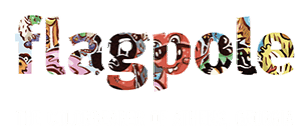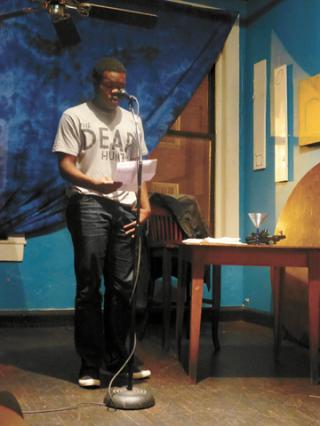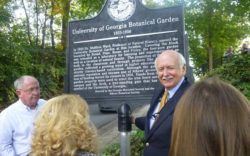It’s the first Wednesday night in March, and the second story of the Globe is filling fast. The lights are low, and a fire is crackling in the back of the room. People are claiming spots on couches and pulling chairs up to tables. Friends greet each other. Pages shuffle. The lone microphone standing on the small stage is checked. Liquid courage is gathered. Periodically, attendees set down their drinks to scrawl their names in a notebook near the stage.
Sociologically, it would be hard to tell what’s going on if you didn’t already know; conservatively dressed men and women chat pleasantly with hipsters, punks and clean-cut UGA undergrads. The age range in the room spans more than 50 years, yet everyone seems to know each other.
A little after eight, Aralee Strange takes the stage to introduce this month’s Word of Mouth open-mic poetry reading. Every reader who signs up will have 10 minutes, she explains. After the break, the featured reader―tonight, Steve Maurer of Philadelphia―will go, followed by more open mic. Strange, a lanky 69-year-old woman in jeans and heavy black boots, has a gravelly Alabama accent, a tiny black lightning bolt tattooed on her cheek and a warm manner that puts people immediately at ease. As founder and organizer of the series, Strange acts as host and emcee throughout the night, catching up with regulars, welcoming newcomers and introducing readers with commentary.
The sign-up list is not capped: 27 people read at the previous month’s gathering, and the event went past midnight. But attendance of the full three to four hours isn’t mandatory. People come and go throughout the night, refreshing their drinks or taking cigarette breaks, or leaving to study for tests or go to bed early. Some don’t show up until 10 p.m. A surprising number, however, not only stays the full three hours of the night’s reading but lingers afterward to chat longer.
“Sign up. Mouth off. Pay attention” is the motto of the series, and as it turns out, there exists in Athens a devoted contingent of people ready to do just that.
“A Meeting Point for Every Walk of Life”
Though there’s no shortage of poetry events in Athens, Word of Mouth is the only regular open reading, and the remarkable diversity of the group can be attributed in part to its welcoming environment.
“There’s no sense of ‘Who are you? Where have you published? Blah, blah, blah… ,’” says Strange. “There are people who have been published, and there are people who haven’t. There are all levels as far as craft, and all levels of poetry, and we don’t judge them about that.”
And the poems read run the complete stylistic gamut, from confessionalism to surrealism to rhythmic spoken word. Some poems are challenging and political, some are funny and anecdotal. Some readers ooze confidence, gesturing and posing as they perform; others read shyly from their pages or cell phones. But the crowd is receptive, and throughout the night the readings are punctuated with “hmms” and “yeahs” and “wows.” Some poems draw cheers. Writers hug each other.
“It is difficult to explain how special it is,” says Michelle Castleberry, a clinical social worker who has written poetry on and off since childhood. “The diversity of voices, sometimes answering, sometimes challenging each other. The way it draws writers of different styles and perspectives. At the breaks and before and after, I am always struck by the connections that get made there, and wonder in what other context that would be possible.”
“It offers a meeting point for every walk of life,” says Ciera Durden, a UGA student majoring in English and Japanese. “I have met published authors, students, criminals, singers, social workers, the rich, the poor―it’s a place for literally every part of the Athens culture, where anyone can communicate, because we’re all there for the same purpose: to speak and to listen.”
Beyond the English Department
Word of Mouth started in December 2009, the brainchild of Strange, a poet and playwright who had moved to Athens from Cincinnati two years earlier.
“I had friends here, but didn’t know any poets. I just figured that in a town like this, there’s going to be some poets somewhere, and I thought the only way to meet them was to start a reading. So, I originally started it just to see who was out there and see if it would fly.”
Strange had been part of northern Ohio’s active poetry scene for 25 years and had organized open-mic series before, so she knew the drill. The Globe was one of the first bars she visited in Athens, and when she saw a poster of Samuel Beckett on the wall and the stage upstairs, she knew it was the place. Wednesdays were slow nights, and the bar was happy to accommodate her experiment. Strange placed ads in Flagpole and hung posters around town; the Banner-Herald wrote an article about her plan. She invited a poet friend from Ohio to be the featured reader.
The open reading was such a success that after a few months it was no longer necessary to even advertise; people knew to show up the first Wednesday of each month. As the passionate response proved, poetry was already part of the lives of many Athenians beyond UGA’s English department or creative writing program. Word of Mouth offered a place for them to commune.
One regular reader from Watkinsville who wasn’t in attendance this week told Strange when they first met that she hadn’t read a poem aloud since sixth grade, though she’d written poetry all her life.
“She was very nervous, and then she proceeded to read three just lovely poems,” Strange recalls. “It just makes my heart sing when that happens.”
Many Word of Mouth members say that the group inspired them to write again and to expand their craft. Alex Johns had been seriously interested in poetry for years, but found it difficult to make space for that kind of writing while working and finishing his Ph.D. Now an English professor at University of North Georgia, he attended his first Word of Mouth reading a year and a half ago and soon began writing poems regularly again.
“I credit Aralee and Word of Mouth for rekindling my love of poetry and for helping me to gain confidence and find a voice as a writer, and I know I’m not alone in that sentiment,” he says.
The first writer to show up at the very first reading was Donald Harris, a quiet, elderly man who lived in an apartment downtown. Harris faithfully attended every month after that, reading three poems each time, which he called “presentations.”
“He never talked much to anyone,” says Strange. “Everybody tried, but he was a taciturn old fellow. But he stayed to the end of each reading and listened intently to others. Sometimes he would respond the following month to a poem or a line he had heard the previous month. He never missed a reading.”
One night, Harris came to the front to read and apologized for having only two presentations; he’d suffered a stroke the week before. “He blew our minds with that one!”
When Harris passed away in 2011 from complications of diabetes, Word of Mouth held a memorial reading in his honor, which included a recording of him reading. Some of his family members were able to attend and hear his poems for the first time.
Poetry as Expression
Everyone in the room shares a passion for poetry, but poetry plays different roles in different people’s lives. For some, it’s an important form of self-expression. Says Durden, “Poetry is my greatest outlet and has also been my greatest source of strength and confidence. I’m primarily a confessional poet, so to be able to take something that is [usually] very difficult and make it ‘art’ is a sort of relief. If you can take something abstract and turn it into something you can vocalize, read, hold in your hands, it suddenly feels like the power has been transferred from that entity to you.”
Bob Ambrose wrote poetry in college, but it wasn’t until he retired in 2009 from a career in environmental engineering with the EPA that his love of writing was renewed.
“We were taking care of my father at home then, and when he passed away two months later, a poem about his last night just came to me. ‘A Summer Morning’s Leave’ was read at his memorial service. After that, my poetry seemed to open back up,” says Ambrose.
His poems often explore spirituality as well as scientific knowledge. Tonight, he reads “Vacuum Collapse,” which was inspired by last summer’s isolation of the Higgs boson and the resulting revelation that the universe may be in a more precarious state than previously thought. He invites the audience to find him later if they’d like more background about the science, and several people do. Ambrose’s performance is also notable in that he is “off book”―since presenting as the featured reader last summer he set a goal of reciting his poems from memory rather than reading them from the page.
For others, poetry offers a powerful tool of witness and a way to educate listeners or readers about injustice. Jay Morris draws a strong reaction from the crowd with his poem “asl” (a chat room acronym for age/sex/location), which begins as a meditation on the casual racism he’s seen in online chat rooms for young gay men.
“You have such an umbrella character trait like sexual orientation, it’s easy to overlook that the people encompassed in that umbrella might not necessarily know how to communicate with or tolerate each other due to lack of experience or whatever,” he explains later. “It’s been shelved because typical LGBT issues like marriage equality, adoption rights, et cetera have taken the forefront of the media. I thought it would be cool to inform people about this lesser known problem.”
The poem also draws from articles he read as he increasingly became aware of the issue. The youngest regular Word of Mouth member, Morris began attending as a high school student at Cedar Shoals when a friend encouraged him to go to a reading. He is now a freshman at UGA majoring in health promotion and behavior.
Speaking out through poetry isn’t always a comfortable process; Jorge Terrell, a local computer tech and a regular reader known to his Word of Mouth friends as “Kagy,” reads a poem written in response to a work read the month before that angered him with its treatment of race. In introducing the poem, he seems tense, and warns the group that they may not like what they’re about to hear. When he finishes, Strange thanks him and tells the audience that this kind of “call and response” between poems is positive and welcome. Terrell remains for the rest of the event, and several friends voice support for his honesty.
A Friendship in Poetry
Part of poetry’s magic is its ability to bring people together and cement relationships. For Steve Maurer and Mark Bromberg, tonight’s reading is also a chance to honor a four-decade friendship. Bromberg, a freelance writer who worked for many years as a journalist and film editor in Atlanta, has been involved with Word of Mouth for the past few years. He suggested his friend Maurer as a featured reader.
The two men met in an English poetry class at Syracuse University in the early 1970s; they became good friends after Maurer borrowed a book from Bromberg. Both admired Beat poets such as Allen Ginsberg and Gary Snyder, and their shared love of poetry was an important part of their friendship. Unfortunately, they lost touch for many years after college, though they both remembered each other fondly. Both continued writing poetry. Fifteen years ago, Bromberg looked Maurer up on the Syracuse alumni website and was shocked to see that Maurer was listed as deceased. He was saddened that he’d waited too long to say hello.
Of course, Maurer was not really dead―tired of receiving junk mail from the university, he’d asked his brother to report his death. Two years ago, he and Bromberg reconnected on Facebook, and they began sending each other poems again.
“Since reconnecting, we’ve shared a lot of emails and phone calls about the creative process, and some of those emails take the shape of poems responding to certain issues each of us raise. It’s really wonderful to have the time to focus energies on our creative paths,” Bromberg says.
Maurer lives in Philadelphia and works in public relations and marketing, but when Bromberg invited him to Athens for the Word of Mouth reading, he accepted. This is his first visit. Tonight, Bromberg reads for 10 minutes at the open mic, and between poems he reminisces to the audience about the good times and poems he and Maurer have shared. Maurer tells his own stories when his turn comes. Many of the poems he reads are recent, but he also produces the typescript of a poem he’d written 30 years ago for Bromberg and had saved all this time.
Until Next Month . . .
Word of Mouth is the longest-running poetry series Strange has organized, and by all signs it is going strong. She’s already excited for April’s reading, which will feature two poets she met in Ohio: Ralph LaCharity and Ben Gulyas.
“Ralph LaCharity is a kind of shaman-like figure; his performance is like watching someone in a trance, channeling his muse, pulling poems from memory,” she says. “Magnificent voice, deep and nuanced, he moves around as though hearing some music only he can hear; it’s a mesmerizing thing to watch. Ben Gulyas seems to be from another time, maybe the ’30s or ’40s. He writes about the unseen in our society: bums and drunks and wise old men of the street. He has a couple of characters who appear regularly in his poems, telling their sad stories. He finds beauty in the back alleys and side streets that few frequent. He also writes about the natural world, including at times the calls of birds and other creatures. Wonderful stuff.”
LaCharity and Gulyas will be featured in the reading to take place on Wednesday, Apr. 3 at 8 p.m. at the Globe.
When tonight’s festivities finish up, a little after 11 p.m., energy is running high. The crowd has thinned, but not substantially. Rather than feeling fatigued after three hours of poetry, the Word of Mouth tribe exudes celebration, congratulating each other on new work and telling each other what moved them during the reading, and basking in the glow of each other’s company, perhaps already thinking of a line for a new poem.
Next month, they’ll be back again, ready to share new poems and celebrate the power of the spoken word.
Word of Mouth meets the first Wednesday of every month at 8 p.m. at The Globe, 199 N. Lumpkin St. Readings are free and open to the public. For more information, visit http://www.athenswordofmouth.com/.
Like what you just read? Support Flagpole by making a donation today. Every dollar you give helps fund our ongoing mission to provide Athens with quality, independent journalism.











